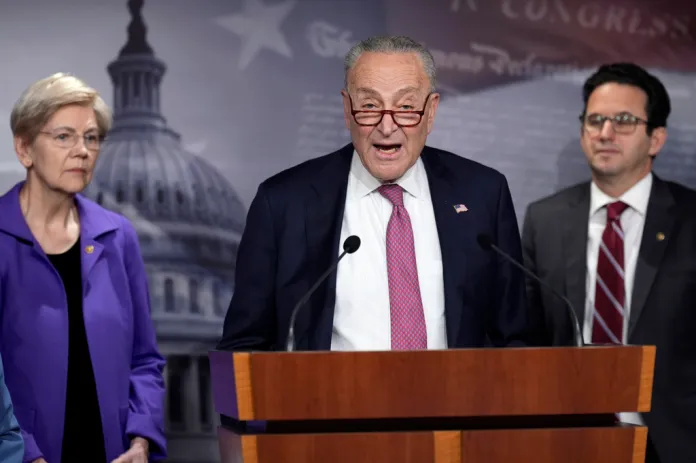


Senate Democrats are rolling out a new demand from Republicans as the parties clash ahead of an Oct. 1 government funding deadline: extend enhanced health insurance premium subsidies set to expire at year’s end.
The Obamacare tax credits offer a far simpler messaging strategy on a subject that impacts millions of low- and middle-income Americans rather than fuming over foreign aid that President Donald Trump has slashed without Capitol Hill’s approval.
Recommended Stories
- Ex-Biden officials sit for Senate interviews on apparent mental decline
- Tim Kaine and Ted Cruz spat sparks debate on God-given rights
- WATCH LIVE: RFK Jr. testifies at Senate hearing amid CDC drama
Senate Democrats are attempting to wield their leverage over Republicans, who will need their help in a few weeks to clear a 60-vote filibuster and avert the latest shutdown deadline.
“The thing that is on everyone’s mind back home is that their premiums are about to go up,” said Sen. Brian Schatz (D-HI), who’s set to become the second-ranked Democrat in the next Congress. “They are not tracking a lot of what we work on, but they are now starting to realize that their healthcare expenses are going to skyrocket almost immediately if Congress doesn’t intervene.”
Sen. Cory Booker (D-NJ), citing an expected rise in healthcare costs, described the moment as a “time to stand and fight. This is a time to draw a line.”
Democrats are seeking to avoid a repeat disaster from earlier this year, when they were “jammed” by congressional Republicans to support a partisan stopgap spending measure to stave off another shutdown threat. Schatz was among the 10 Senate Democrats to take heat from his party for siding with the GOP last go-around.
“If [Republicans] decide to go it alone, they’re not going to have Democratic support,” he added.
Expiring monthly credits for plans under the Obama-era healthcare system means fewer enrollees and warnings from insurance companies that higher premiums are in store across the board, regardless if coverage is through a private employer or a government-run exchange.
With Affordable Care Act marketplace insurers already submitting rate changes for 2026 based on expected subsidy cuts, the average year-over-year premium increase is estimated to be 20% for those with Obamacare plans, according to the Kaiser Family Foundation. A 2024 analysis from the non-profit organization calculated a 573% annual premium increase, or $917, for a 45-year-old enrollee making $25,000 (166% of the poverty rate) without the extra subsidies. That same person making $65,000 (432% of the poverty rate) would see a $941 annual increase, or a 17% hike.
Combatting Trump’s $5 billion “pocket” rescission of foreign aid funds has quickly become a secondary argument for many Democrats and has taken a backseat to healthcare as they brandish their government funding leverage.
“If [Republicans] want Democratic votes, then they have to roll back some of those healthcare cuts,” Sen. Elizabeth Warren (D-MA) said. “Republicans are increasing healthcare costs, taking away healthcare from millions of Americans, and we Democrats need to say, ‘Enough.’”

Boosted Obamacare premium credits decreased monthly out-of-pocket costs for lower-income individuals and families, as well as for those who make several times the poverty rate. But they were created and extended under the Biden administration, making them politically radioactive for many Republicans to support. The nonpartisan Congressional Budget Office has estimated that 3.8 million people annually from 2026 to 2034 could lose insurance without the expanded credits, or more than 30 million total. Making the enhanced benefits permanent would cost $335 billion over 10 years, per CBO.
“For me, it’s going to be depending on what happens with some of the healthcare subsidies that are going to be up for renewal,” Sen. Ruben Gallego (D-AZ) said of voting for government funding.
Setting aside the brewing shutdown brawl, allowing the subsidies to go by the way side could also be politically untenable for certain vulnerable Republicans and tee up voter backlash in next year’s midterms. A group of House Republicans is proposing to punt the issue past the 2026 elections with a bill for a one-year extension.
HOUSE GOP WEIGHS WHETHER TO SAVE EXPANDED OBAMACARE TAX CREDITS
But in three forced amendment votes throughout the year, all Senate Republicans — save for Sen. Lisa Murkowski (R-AK) — have rejected Democratic efforts to extend the insurance premium credits.
“Republicans already ripped health care away from millions of Americans and drove up costs for millions more — all to hand tax breaks to billionaires,” Senate Minority Leader Chuck Schumer (D-NY) said in a statement, referencing President Donald Trump’s domestic policy agenda passed this summer. “If Republicans are finally waking up, it’s not out of compassion — it’s because they know their cruel, billionaire-first agenda is indefensible to the American people.”
